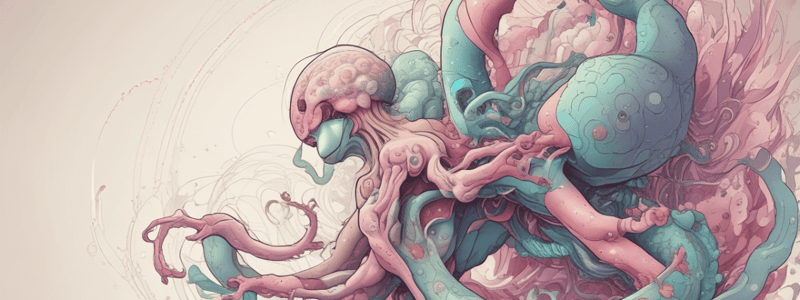Podcast
Questions and Answers
What is the primary mechanism of action of biological therapies in reducing inflammation?
What is the primary mechanism of action of biological therapies in reducing inflammation?
- Enhancing the activity of immunomodulators
- Stimulating the immune system
- Increasing the production of corticosteroids
- Reducing the activity of tumor necrosis factor (TNF) (correct)
What is the most common cause of intestinal obstruction?
What is the most common cause of intestinal obstruction?
- Twisting of the bowel
- Paralytic ileus
- Tumors
- Adhesions (correct)
Which of the following is a clinical presentation of intestinal obstruction?
Which of the following is a clinical presentation of intestinal obstruction?
- Weight loss
- Diarrhea
- Abdominal distension (correct)
- Increased appetite
What is the diagnostic tool used to confirm intestinal obstruction?
What is the diagnostic tool used to confirm intestinal obstruction?
Which of the following medications is an immunomodulator?
Which of the following medications is an immunomodulator?
What is the treatment option for intestinal obstruction caused by twisting of the bowel?
What is the treatment option for intestinal obstruction caused by twisting of the bowel?
What is the primary goal of treatment for intestinal obstruction?
What is the primary goal of treatment for intestinal obstruction?
Which of the following is a complication of intestinal obstruction?
Which of the following is a complication of intestinal obstruction?
What is the primary symptom of Irritable Bowel Syndrome (IBS)?
What is the primary symptom of Irritable Bowel Syndrome (IBS)?
What is the main difference between Crohn's Disease and Ulcerative Colitis?
What is the main difference between Crohn's Disease and Ulcerative Colitis?
What is the primary location affected in Ulcerative Colitis?
What is the primary location affected in Ulcerative Colitis?
What is the purpose of a barium enema in IBD diagnosis?
What is the purpose of a barium enema in IBD diagnosis?
What is the primary goal of treatment in Crohn's Disease?
What is the primary goal of treatment in Crohn's Disease?
What is the primary goal of dietary treatment in IBD?
What is the primary goal of dietary treatment in IBD?
What is the role of corticosteroids in the treatment of Crohn's Disease?
What is the role of corticosteroids in the treatment of Crohn's Disease?
What is the mechanism of action of aminosalicylates in IBD treatment?
What is the mechanism of action of aminosalicylates in IBD treatment?
What is the name of the biologic medication used to treat Crohn's Disease?
What is the name of the biologic medication used to treat Crohn's Disease?
What is the main complication of Crohn's Disease?
What is the main complication of Crohn's Disease?
What is the primary action of corticosteroids in IBD treatment?
What is the primary action of corticosteroids in IBD treatment?
What is the purpose of immunomodulators in IBD treatment?
What is the purpose of immunomodulators in IBD treatment?
What is the role of surgery in the treatment of Crohn's Disease?
What is the role of surgery in the treatment of Crohn's Disease?
What is the primary treatment option for IBS?
What is the primary treatment option for IBS?
What is the complication of Ulcerative Colitis that may require surgery?
What is the complication of Ulcerative Colitis that may require surgery?
What is the characteristic of the stools in Ulcerative Colitis?
What is the characteristic of the stools in Ulcerative Colitis?
What is the likely diagnosis of the patient who becomes increasingly somnolent and has a drop in BP after being admitted to the surgical floor?
What is the likely diagnosis of the patient who becomes increasingly somnolent and has a drop in BP after being admitted to the surgical floor?
Which type of hepatitis is transmitted through the fecal-oral route?
Which type of hepatitis is transmitted through the fecal-oral route?
What is the primary goal of nutrition therapy in the management of severe malnutrition?
What is the primary goal of nutrition therapy in the management of severe malnutrition?
What is the primary intervention for managing hyperglycemia in patients receiving total parenteral nutrition?
What is the primary intervention for managing hyperglycemia in patients receiving total parenteral nutrition?
What is the primary indication for using antiviral and immunomodulating drugs in patients with hepatitis?
What is the primary indication for using antiviral and immunomodulating drugs in patients with hepatitis?
What is the primary purpose of administering corticosteroids in the management of intestinal obstruction?
What is the primary purpose of administering corticosteroids in the management of intestinal obstruction?
What is the primary complication of intestinal obstruction that requires close monitoring?
What is the primary complication of intestinal obstruction that requires close monitoring?
What is the primary goal of administering antiemetic medications in patients with hepatitis?
What is the primary goal of administering antiemetic medications in patients with hepatitis?
What is the characteristic feature of small-bowel intestinal obstruction?
What is the characteristic feature of small-bowel intestinal obstruction?
Which of the following is a common cause of paralytic ileus?
Which of the following is a common cause of paralytic ileus?
What is the typical electrolyte imbalance seen in paralytic ileus?
What is the typical electrolyte imbalance seen in paralytic ileus?
Which of the following is a characteristic feature of large-bowel intestinal obstruction?
Which of the following is a characteristic feature of large-bowel intestinal obstruction?
What is the typical acid-base imbalance seen in small-bowel obstruction?
What is the typical acid-base imbalance seen in small-bowel obstruction?
Which of the following is a type of mechanical intestinal obstruction?
Which of the following is a type of mechanical intestinal obstruction?
What is the typical abdominal examination finding in intestinal obstruction?
What is the typical abdominal examination finding in intestinal obstruction?
Which of the following laboratory tests is often elevated in intestinal obstruction?
Which of the following laboratory tests is often elevated in intestinal obstruction?
Flashcards are hidden until you start studying
Study Notes
Inflammatory Bowel Disease (IBD)
- Idiopathic, inflammatory, autoimmune disease
- Age of onset: 20-30s
- Higher incidence in Caucasians than African Americans and Hispanics
- Higher incidence in developed countries
- Higher risk for colon cancer and decreased quality of life due to symptoms
Types of IBD
- Crohn's Disease (CD)
- Inflammatory disease of small intestine (mainly) and can occur anywhere in GI tract
- Inflammation causes thickening, leading to fistulas and/or bowel obstruction
- Ulcerative Colitis (UC)
- Ends in "itis"
- Affects colon (ulcers)
- Most cases only affect the rectum and sigmoid
- Continuous and diffuse inflammation
Signs and Symptoms of IBD
- Crohn's Disease:
- Diarrhea
- Abdominal pain
- Fever
- Anorexia
- Visible peristalsis
- Anemia
- Weight loss
- Fistula
- Signs of poor nutrition (brittle nails and hair, malabsorption)
- Ulcerative Colitis:
- Bloody, liquid stools with mucus
- Urge to defecate comes on quickly
- Nutritional deficiencies
- Hemorrhage
- LLQ abdominal pain
- Weight loss
- Tenesmus (rectal fullness, inability to pass stools, straining during BMs)
Diagnosis and Treatment of IBD
- Diagnosis:
- Barium enema
- Colonoscopy
- Sigmoidoscopy
- Biopsy
- Treatment:
- Medications:
- Aminosalicylates (inhibit prostaglandins, decreasing inflammation)
- Corticosteroids (decrease inflammation)
- Immunomodulators (alter immune response)
- Dietary changes:
- Low residue diet
- Avoid seeds, beans, nuts, and kernels
- Avoid caffeine and alcohol
- Increase omega-3s
- Small, frequent meals
- Nutritional supplements
- Surgery (curative in UC, not in CD)
- Medications:
Intestinal Obstruction
- Small bowel obstruction:
- Abdominal discomfort or pain with visible peristaltic waves
- Upper or epigastric abdominal distention
- N/V, possibly containing fecal matter
- Obstipation
- Severe fluid and electrolyte disturbances
- Large bowel obstruction:
- Intermittent lower abdominal cramping
- Lower abdominal distention
- Minimal or no vomiting
- Constipation or ribbon-like stools
- No major fluid and electrolyte imbalance
- Diagnosis:
- Labs: Elevated WBC, electrolyte imbalance, metabolic acidosis or alkalosis
- PE: Distension, visible hernia?
Irritable Bowel Syndrome (IBS)
- Symptoms:
- Diarrhea or constipation
- Abdominal pain or discomfort
- Bloating
- Urgency to defecate
- Diagnosis:
- Must satisfy Rome Criteria
- Rule out other causes
- Treatment:
- Dietary changes:
- High fiber diet
- Avoid caffeine
- Avoid raw foods
- Medications:
- Antispasmodics
- Antidepressants
- Laxatives
- Other treatments:
- Peppermint oil capsules
- TCA's (for pain and psychiatric disorders)
- Dietary changes:
Hepatitis
- Types:
- A: Fecal-oral route, contaminated food, like a GI illness
- B: Blood or open sores, direct contact, unprotected sex, needle stick, sharing razor
- C: IV drug use, chronic infection leading to cirrhosis
- D: IV drugs, sex
- E: Waterborne infection from fecal contamination, like hepatitis A
- Symptoms:
- Flu-like symptoms
- Fatigue
- Loss of appetite
- Nausea and vomiting
- Abdominal pain
- Dark urine
- Yellowing of the skin and eyes
Osteomalacia
- Interventions and nutrition therapy:
- Rest
- High carbohydrate and calorie diet
- Moderate fat and low-moderate protein diet
- Small frequent meals
- Avoid alcohol
- Vitamin supplements
- Drug therapy:
- Antiemetic
- Antiviral and immunomodulating drugs for chronic hepatitis B and C
Nutritional Options
- Total Parenteral Nutrition (TPN):
- Management of severe malnutrition
- Lab values: Pre-albumin, blood glucose
- Interventions:
- Change TPN bag and set within 24 hours
- Monitor blood glucose level
- Monitor signs and symptoms of hyperglycemia
- Follow infusion rate and normal saline flush rate
- Nasogastric Tube (NGT) and Jejunostomy:
- Feeding or food supplement
- Interventions:
- Follow infusion rate and normal saline flush rate
- Check for residuals
- Position head of the bed in high Fowlers
Studying That Suits You
Use AI to generate personalized quizzes and flashcards to suit your learning preferences.




